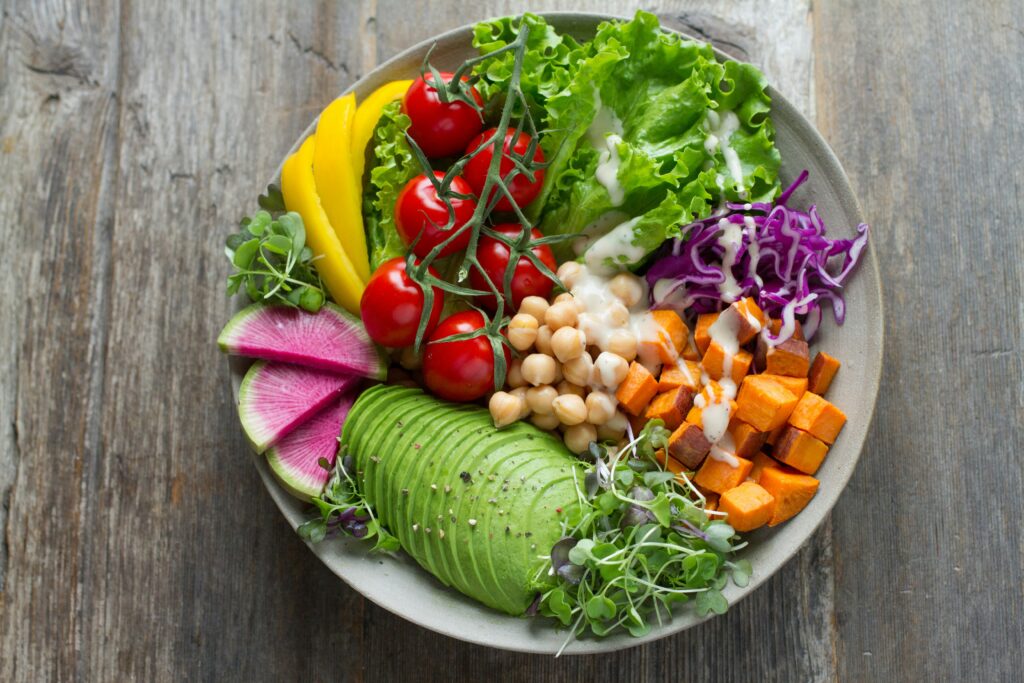
Making the switch to a plant-based diet can be a game-changer for your health. Consuming complete, unprocessed plant foods like fruits, vegetables, legumes, nuts, and seeds is emphasised in this dietary strategy. These diets have been repeatedly shown to lower blood pressure, lower cholesterol, and improve heart health in general. They can also help control weight and lower the chance of developing long-term conditions like diabetes and cancer. You may nourish your body and enjoy a variety of delicious, health-promoting meals by making nutrient-dense foods a priority.
Understanding Plant-Based Diets
Foods generated mostly from plants are included in the diet. While cutting out all animal products isn’t necessary, the goal here is to increase the amount of naturally grown items in your diet.
Important elements consist of:
- Fruits and vegetables: abundant in antioxidants, minerals, and vitamins.
- Whole Grains: These include quinoa, brown rice, and oats; they are high in fibre and vital minerals.
- Legumes: A group of foods that are high in fibre and protein that includes beans, lentils, and peas.
- Nuts and seeds: Provide protein, several vitamins and minerals, and good fats.
Health Benefits of Plant-Based Diets
Diets high in plants are frequently associated with decreased body weight and a decreased risk of obesity. This is partially due to the fact that these diets usually have higher fibre content and less calories, which can prolong feelings of fullness.
“Whole plant foods tend to be nutrient-dense and low in calories, making it easier to manage your weight while still feeling satisfied.”
Dr. Michael Greger – How Not to Diet
Numerous chronic diseases can be prevented with these diet.
Type 2 diabetes: Eating a diet high in fruits, vegetables, and whole grains can reduce the risk of the disease and increase insulin sensitivity.
Cancer: Antioxidants from these diets can shield cells from harm. Studies reveal a correlation between a diet rich in fruits and vegetables and a decreased risk of many types of cancer.
Inflammation: Anti-inflammatory foods are abundant in these diets and can help lower chronic inflammation, which is a contributing factor to many chronic illnesses.
As the beneficial effects of these diet on heart health are among its most important advantages. Diets high in fruits, vegetables, and whole grains have been demonstrated in studies to lower blood pressure and cholesterol.
“People who ate the most plant-based foods were the healthiest and tended to avoid chronic disease. These people also had lower cholesterol and blood pressure levels, leading to better overall heart health.”
Dr. T. Colin Campbell -The China Study
Hacks to switch to vegan diet
1. Start Slow
- Begin by incorporating more plant-based meals into your diet gradually. Start with one or two plant-based meals per week and slowly increase the frequency as you become more comfortable with the changes.
- Tip: Consider dedicating one day a week to eat vegan meals.
2. Plan Your Meals
- Planning your meals in advance can help ensure you have all the ingredients you need and reduce the temptation to revert to less healthy options. Prepare a weekly menu that includes a variety of plant-based foods.
- Tip: Make a detailed grocery list that focuses on whole, unprocessed plant foods.
3. Experiment with Recipes
- Try new plant-based recipes to keep your meals interesting and delicious. Experiment with different cuisines and cooking methods to discover what you enjoy most.
- Tip: Consider taking a plant-based cooking class or watching online tutorials to learn new techniques and recipes.
4. Read Labels
- Choose whole, unprocessed foods as much as possible. Avoid products with added sugars, unhealthy fats, and excessive sodium.
- Tip : Look for products with short, recognizable ingredient lists.
5. Find Plant-Based Alternatives
- Replace dairy products with alternatives such as almond milk, soy milk, and coconut yogurt for a healthier choice.
- Tip: Explore plant-based protein sources like beans, lentils, tofu, tempeh, and seitan.
6. Stay Nutrient-Conscious
- Ensure you have a variety of plant foods in your diet to meet your nutritional needs. Include a mix of fruits, vegetables, whole grains, legumes, nuts, and seeds.
- Tip: Consider taking supplements for nutrients that may be harder to obtain from these diet alone, such as vitamin B12, vitamin D, and omega-3 fatty acids..
7. Eat Mindfully
- Pay attention to your hunger and fullness cues. Eating mindfully can help you enjoy your meals more and prevent overeating.
- Tip: Take the time to chew your food thoroughly.
8. Stay Hydrated
- Drink plenty of water throughout the day to stay hydrated. Additionally, proper hydration is essential for overall health and can help support your plant-based diet.
- Tip: Incorporate herbal teas into your routine as a flavorful way to stay hydrated.
9. Seek Support
- Join online forums, social media groups, or local clubs focused on plant-based eating. Connecting with others on the same journey can provide support, motivation, and recipe ideas.
- Tip: Share your dietary goals with family and friends.
10. Enjoy the Process
- Acknowledge and celebrate your progress, no matter how small. Every plant-based meal is a step toward better health.
- Tip: Enjoy the journey of discovering new foods and flavors. Moreover, cooking and eating should be pleasurable experiences, so enjoy experimenting with your plant-based diet.
One of the most effective ways to enhance your health and wellbeing is to switch to a plant-based diet and Thrive market is one of the easiest solutions to all. You may lower your risk of chronic diseases and enjoy a variety of delicious meals by putting an emphasis on full, unprocessed plant foods.
“A plant-based diet is not just a diet; it’s a lifestyle that can transform your health and vitality.”
Dr. Neal Barnard – 21-Day Weight Loss Kickstart